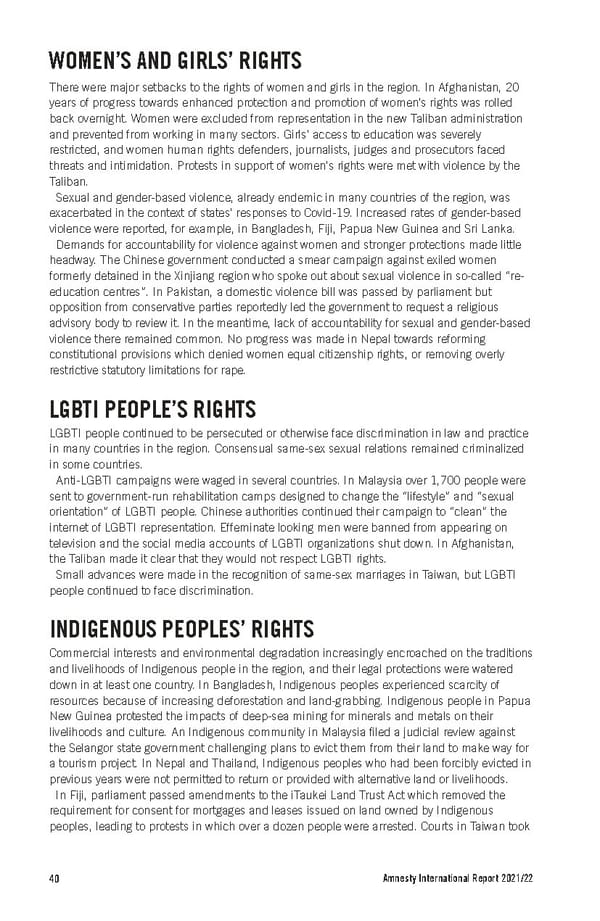WOMEN’S AND GIRLS’ RIGHTS There were major setbacks to the rights of women and girls in the region. In Afghanistan, 20 years of progress towards enhanced protection and promotion of women’s rights was rolled back overnight. Women were excluded from representation in the new Taliban administration and prevented from working in many sectors. Girls' access to education was severely restricted, and women human rights defenders, journalists, judges and prosecutors faced threats and intimidation. Protests in support of women’s rights were met with violence by the Taliban. Sexual and gender-based violence, already endemic in many countries of the region, was exacerbated in the context of states’ responses to Covid-19. Increased rates of gender-based violence were reported, for example, in Bangladesh, Fiji, Papua New Guinea and Sri Lanka. Demands for accountability for violence against women and stronger protections made little headway. The Chinese government conducted a smear campaign against exiled women formerly detained in the Xinjiang region who spoke out about sexual violence in so-called “re- education centres”. In Pakistan, a domestic violence bill was passed by parliament but opposition from conservative parties reportedly led the government to request a religious advisory body to review it. In the meantime, lack of accountability for sexual and gender-based violence there remained common. No progress was made in Nepal towards reforming constitutional provisions which denied women equal citizenship rights, or removing overly restrictive statutory limitations for rape. LGBTI PEOPLE’S RIGHTS LGBTI people continued to be persecuted or otherwise face discrimination in law and practice in many countries in the region. Consensual same-sex sexual relations remained criminalized in some countries. Anti-LGBTI campaigns were waged in several countries. In Malaysia over 1,700 people were sent to government-run rehabilitation camps designed to change the “lifestyle” and “sexual orientation” of LGBTI people. Chinese authorities continued their campaign to “clean” the internet of LGBTI representation. Effeminate looking men were banned from appearing on television and the social media accounts of LGBTI organizations shut down. In Afghanistan, the Taliban made it clear that they would not respect LGBTI rights. Small advances were made in the recognition of same-sex marriages in Taiwan, but LGBTI people continued to face discrimination. INDIGENOUS PEOPLES’ RIGHTS Commercial interests and environmental degradation increasingly encroached on the traditions and livelihoods of Indigenous people in the region, and their legal protections were watered down in at least one country. In Bangladesh, Indigenous peoples experienced scarcity of resources because of increasing deforestation and land-grabbing. Indigenous people in Papua New Guinea protested the impacts of deep-sea mining for minerals and metals on their livelihoods and culture. An Indigenous community in Malaysia filed a judicial review against the Selangor state government challenging plans to evict them from their land to make way for a tourism project. In Nepal and Thailand, Indigenous peoples who had been forcibly evicted in previous years were not permitted to return or provided with alternative land or livelihoods. In Fiji, parliament passed amendments to the iTaukei Land Trust Act which removed the requirement for consent for mortgages and leases issued on land owned by Indigenous peoples, leading to protests in which over a dozen people were arrested. Courts in Taiwan took Amnesty International Report 2021/22 40
 Amnesty International Report 2021/22 Page 39 Page 41
Amnesty International Report 2021/22 Page 39 Page 41